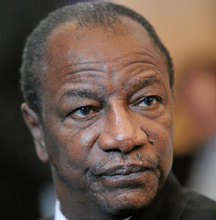
The country is rich in other mineral resources, too, including iron, diamonds, gold, cobalt, copper, and uranium, but “we don’t have the technological expertise that we need,” said the president first elected in 2010 and reelected in 2015.
To provide investment incentives and to help spread the wealth, the government adopted a mining code in 2011, he told a packed house at the Brookings Institution in Washington, D.C. The code requires a 15 percent government stake in the mining companies and a seat on the company’s governing boards, and another 15 percent of the revenue goes to the local community. He says, the country wants to create a situation where the locals feel “they don’t have to leave the countryside or the country all together,” to see an improved life.
The former president of the African Union is an avowed pan-Africanist. “Borders are artificial,” is how he explained his global perspective while inviting the Diaspora to invest in his country. “The Diaspora, they can come back to Africa or go back and forth,” he suggested.
As with many African leaders, Conde believes in climate change and is not a proponent of “clean coal.” “I am convinced that it does not exist,” he said. While welcoming the investment of all people, he added that “it is a mistake to think that we are just giving away our resources blindly” to China, he added.
The Gross Domestic Product Annual Growth Rate in Guinea was roughly 5.8 in 2018, while it was about 2.9 in the United States. To increase the country’s wealth, he sees developing technical expertise as their main challenge. Because of colonization we have been relegated to suppliers of raw materials “we must have better control of the value chain,” he argued. Socially, he added that the country must deal with teenage marriage and female genital mutilation as well.
What’s Behind Guinea’s Name?
There are many countries using the name Guinea around the world. Some suggest it was the Portuguese who were the first Europeans who began to refer to the “Black” African peoples living south of the Senegal River as Guinea..
As with many African leaders, Guinea president Alpha Conde believes in climate change and is not a proponent of “clean coal.” “I am convinced that it does not exist,” he said.
The historical colonies of French Guinea, Spanish Guinea, and Portuguese Guinea gained independence in that order and subsequently named themselves Guinea ( 1958, capital Conakry), Equatorial Guinea (1968, capital Malabo, and Guinea-Bissau (1973, capital Bissau).
A Spanish explorer who saw resemblance of the people in Papua New Guinea, in southeast Asia, with those who he had seen along the Guinea coast in Africa led him to combine the local term for the island, Papua, with Guinea to produce what is now known as Papua New Guinea.
In South America, there is French Guiana, an overseas territory of France, Guyana (formerly British Guiana), and the former Dutch Guiana is now called Suriname.
There was also German New Guinea. It included what is now the Federated States of Micronesia. Even Ghana, the Black star republic, comprises what was called Danish Guinea (also Danish Gold Coast) and Swedish Guinea (Swedish Gold Coast) along with parts of German Guinea.






